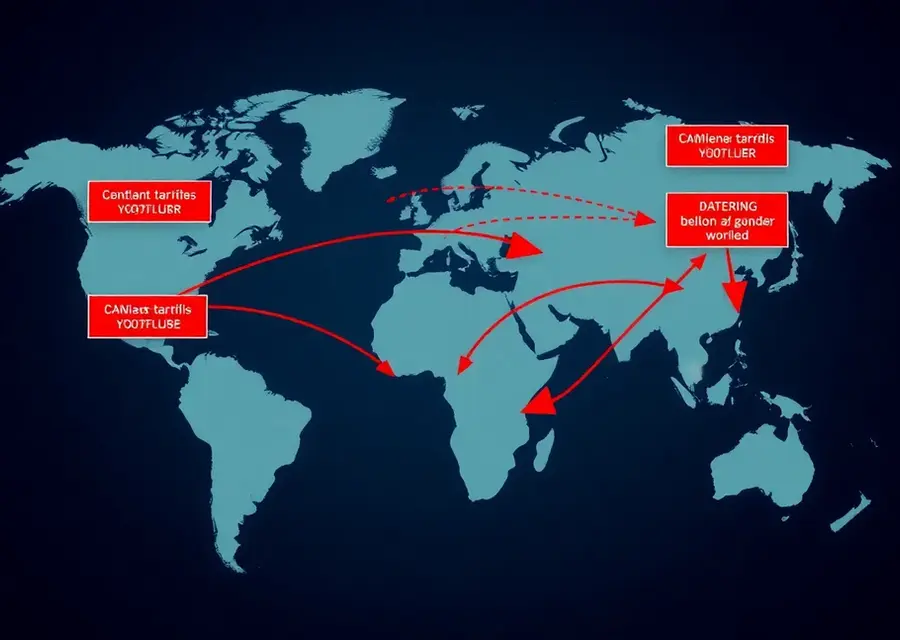Understanding Trade Policy Impact: Tariffs, Exports, and Global Realignments
- THE MAG POST

- Sep 5
- 6 min read

The intricate global trade environment is often reshaped by strategic policy decisions, with punitive tariffs emerging as a significant tool that can disrupt established export markets. Nations heavily reliant on international trade must remain vigilant, as these measures can rapidly alter competitive landscapes and necessitate swift strategic adjustments to maintain economic stability and growth.
Understanding these shifts is crucial for navigating the complexities of modern commerce. This exploration delves into how such trade policies impact export-dependent economies and examines the critical realignments required in supply chains and geopolitical strategies to foster resilience in a dynamic global marketplace.
The Shifting Tides of Global Trade: Tariffs and Their Ripple Effects
In the intricate dance of international commerce, trade policies often act as powerful catalysts, capable of reshaping economic landscapes overnight. When major economies implement punitive tariffs, the repercussions are felt far beyond their borders, creating intricate webs of consequence that touch producers and consumers alike. This section delves into how such measures can disrupt established trade flows, particularly impacting nations heavily reliant on exports, and examines the strategic adjustments businesses and governments must make to navigate these turbulent waters.
Impact on Export-Oriented Economies
Countries that have cultivated robust export sectors often find themselves particularly vulnerable to sudden shifts in trade policy. When tariffs are imposed, the cost of goods increases, making them less competitive in the target market. This can lead to a significant downturn in export volumes, affecting industries, employment, and overall economic growth. The challenge lies in the speed at which these changes can occur, often leaving little time for businesses to pivot their strategies or find alternative markets.
Consider a nation whose economy is heavily geared towards exporting specific manufactured goods or agricultural products. The imposition of a substantial tariff by a key trading partner can effectively shut down or severely curtail access to that market. This forces businesses to either absorb the cost, reduce production, or seek entirely new avenues for their products. The latter often involves navigating complex new market entry barriers, regulatory hurdles, and developing entirely new distribution networks, a process that can be both time-consuming and capital-intensive.
Strategic Realignments in Supply Chains
The imposition of tariffs often serves as a stark reminder of the vulnerabilities inherent in concentrated supply chains. Businesses that have historically relied on a single market or a limited number of trading partners may find themselves re-evaluating their global footprint. This can spur a strategic realignment, encouraging diversification of export destinations and the exploration of domestic markets to mitigate future risks. The aim is to build resilience, ensuring that the economy is not overly exposed to the trade policies of any single nation.
This strategic shift can manifest in various ways. Companies might invest in research and development to create new product lines that are less susceptible to tariffs or appeal to different consumer bases. Others might explore vertical integration, seeking to control more aspects of their production and distribution to better manage costs. Governments, too, play a crucial role by fostering new trade agreements, providing incentives for export diversification, and investing in infrastructure that supports alternative trade routes and markets.
The Role of Geopolitical Factors in Trade Disruptions
It is crucial to recognize that trade policies, especially punitive tariffs, are often intertwined with broader geopolitical considerations. They can be employed as tools of economic leverage in international disputes, signaling displeasure or exerting pressure on another nation's policies. Understanding these underlying geopolitical currents is vital for businesses and policymakers seeking to anticipate and respond effectively to trade disruptions.
The dynamic interplay between economic interests and political objectives means that trade landscapes can change rapidly. A tariff initially imposed for economic reasons might evolve into a broader geopolitical negotiation. Conversely, a geopolitical tension might lead to the implementation of tariffs as a non-military form of coercion. This complexity requires a sophisticated approach to international trade strategy, one that considers not only market economics but also the evolving global political climate.
Navigating the Fallout: Russia's Oil Pivot
The recent shifts in global oil markets, particularly Russia's redirection of crude oil exports away from certain Western markets, serve as a compelling case study of how trade policies and geopolitical pressures can dramatically alter established supply chains. Following international sanctions and a strategic pivot, Russia has increasingly focused its energy exports towards Asian markets, notably China and India. This redirection, driven by a need to maintain revenue streams amidst international pressure, has significant implications for global energy prices and the trade dynamics of importing nations.
Redirection of Russian Crude Oil
Historically, European nations were significant importers of Russian crude oil. However, in response to geopolitical events and subsequent sanctions, many European countries have sought to reduce their reliance on Russian energy. This has compelled Russia to seek alternative markets for its vast oil production. Reports indicate a substantial decrease in the volume of crude oil arriving in traditional Western markets, with a corresponding increase in shipments to Asian destinations.
This strategic redirection is not merely a logistical adjustment; it represents a fundamental shift in global energy trade patterns. Russia has actively cultivated relationships with major Asian energy consumers, offering discounted prices to compensate for the increased shipping distances and the perceived risks associated with its oil. This has created opportunities for countries like India, which has historically been a significant importer of crude oil, to secure supplies at potentially more favorable terms, albeit with new logistical considerations.
Impact on Indian Import Dynamics
India, being one of the world's largest oil importers, has been significantly affected by these global trade realignments. The nation has historically diversified its energy imports to ensure stability and affordability. The increased availability of Russian crude oil, often offered at competitive prices, has presented India with a strategic opportunity to bolster its energy security. While the total volume of crude oil imports from Russia has seen fluctuations, the trend indicates a growing reliance on this source, particularly when compared to pre-shift levels.
This shift in import dynamics has broader economic implications for India. Lower crude oil import costs can translate into reduced inflation, lower transportation costs, and improved margins for domestic industries. However, it also raises questions about long-term energy security, the environmental impact of increased shipping distances, and the nation's position within the complex web of international energy politics. Managing these factors requires careful planning and a proactive approach to energy policy.
Future Outlook and Market Volatility
The global energy market remains inherently volatile, influenced by a confluence of geopolitical events, economic policies, and supply-demand dynamics. The ongoing redirection of Russian oil exports is just one facet of this complex ecosystem. Future price movements and trade flows will continue to be shaped by international relations, the pace of global economic recovery, and the ongoing transition towards renewable energy sources.
For nations like India, the ability to adapt to these market shifts will be paramount. Maintaining a diversified import strategy, investing in domestic energy production, and exploring alternative energy solutions will be crucial for ensuring long-term energy security and economic stability. The lessons learned from these recent trade disruptions underscore the importance of agility and foresight in navigating the ever-changing landscape of global commerce.
Conclusion: Adapting to a Dynamic Global Economy
The global economic landscape is in perpetual flux, with trade policies, geopolitical maneuvers, and market forces constantly interacting to create new challenges and opportunities. The instances of punitive tariffs and the redirection of major commodity flows, such as Russian crude oil, underscore the imperative for nations and businesses to cultivate resilience and adaptability. Strategic diversification, proactive policy-making, and a keen awareness of global dynamics are no longer optional but essential components for sustained economic prosperity in an increasingly interconnected yet unpredictable world.
Key Concept | Impact/Explanation |
Punitive Tariffs | Imposed trade barriers that increase the cost of imported goods, reducing competitiveness and potentially choking exports. |
Export-Oriented Economies | Nations whose economic growth heavily relies on selling goods and services to other countries; highly sensitive to tariff changes. |
Supply Chain Realignment | Strategic adjustments to distribution and sourcing networks to mitigate risks associated with trade policy changes and geopolitical instability. |
Geopolitical Factors | The influence of international relations and political objectives on trade policies, often leading to economic leverage or disputes. |
Russian Oil Exports | A case study of trade redirection, where sanctions and geopolitical pressures led Russia to pivot its crude oil supply towards Asian markets. |
Indian Import Dynamics | The effect of global energy shifts on India's import strategy, presenting opportunities for securing energy at competitive prices while managing new risks. |
Market Volatility | The inherent instability of global markets, influenced by ongoing geopolitical events, economic policies, and supply-demand fluctuations. |
Economic Resilience | The capacity of an economy to withstand and recover from shocks, achieved through diversification, strategic planning, and adaptability. |






















































Comments